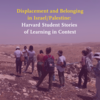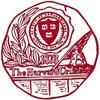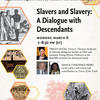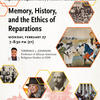Latest News
- RPL in the News: "District 214 hosts World Religions Summit, explores religious diversity in a multicultural society"
- RPL in the News: "It may be neither higher nor intelligence: Religious scholars examine value, limits of AI"
- Advancing Religious Literacy in Governance: The Religious Freedom Around the World Subcommittee Hearing
- Sights and Sounds: Climate Justice Week
- RPL in the News: "Boston's centuries-long history of climate activism stems from ancestry and spirituality"
- Video: RCPI Book Series: Decolonizing Religion and the Practice of Peace
Filter News by Month
- March 2024 (7)
- January 2024 (2)
- December 2023 (1)
- November 2023 (3)
- October 2023 (1)
- 1 of 12
- »
Copyright © 2024 The President and Fellows of Harvard College | Privacy | Accessibility | Digital Accessibility | Report Copyright Infringement






